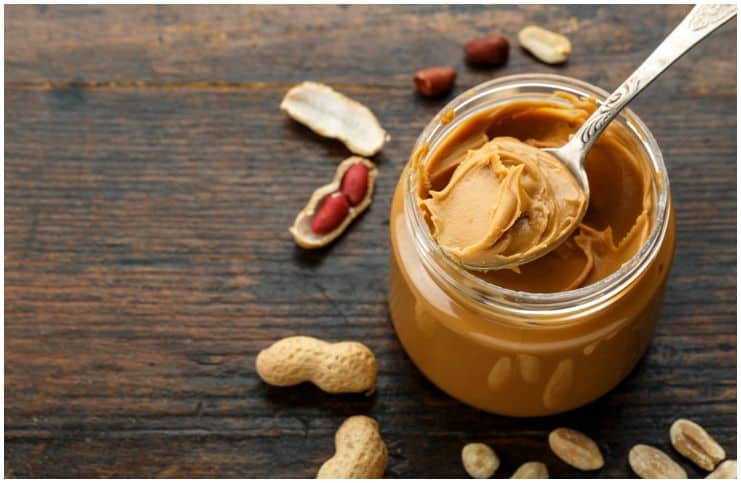Peanuts (Arachis Hypogaea) – Side Effects & Health Benefits:
Facts
Peanuts, also known as groundnuts (scientific name – Arachis hypogaea), belong to the Fabaceae family and are one of the most commonly eaten plant foods in the world today. Peanuts originated in South America, where they have existed for thousands of years.
They played an important function in the diet of the Aztecs and other Native Indians in Mexico and South America.
Nutritional Profile
They are rich in essential nutrients. In a 100 g serving, they provide 570 calories and are an excellent source of several B vitamins (B1, B2, B3, B6, B12), vitamin E, several dietary minerals, such as magnesium (52% DV), manganese (95% DV), dietary fiber, and phosphorus (48% DV). They also contain about 25 g protein per 100 g.
One ounce, or 28 grams, of groundnuts, typically makes up a single serving and has about 161 calories. This is equal to 33 nuts, which often grow two to a pod. A single 1-ounce serving of raw groundnuts has 4.57 grams of carbohydrates and 7.31 grams of protein.
There are 13.96 grams of fat in a single serving, although the majority of this is made up of monounsaturated fat (MUFA), polyunsaturated fat, and 2 grams of saturated fat included in the total.
One exceptionally healthful MUFA found in peanuts is oleic acid (omega 9 acids), the same healthy fatty acid found in olive oil, which may contribute to cardiovascular health.
Health Benefits of Arachis Hypogaea
#1 Increases HDL CHolesterol
They compose plentiful levels of mono-unsaturated fatty acids (MUFA), especially oleic acid.
MUFA helps lower bad cholesterol (LDL) and increases good cholesterol (HDL) level in the blood.
The latest research studies suggest that the Mediterranean diet which is rich in MUFAs help to prevent coronary artery disease (heart disease) and stroke risk (cerebrovascular accident) by favoring healthy blood lipid profile.
#2 Vitamin B3
They contain vitamin B3 – niacin. In fact, a 1 oz serving of groundnuts provides around 15% of the recommended daily value of niacin (also known as vitamin B3), a vitamin important in energy production.
Tip – recent studies suggest that boiling/roasting enhances antioxidant bioavailability in the nuts.
#3 High Levels of Antioxidants
Polyphenolic anti-oxidants are present in the groundnuts in high concentrations.
P-coumaric acid (organic compound) has the ability to lower the risk of stomach cancer (gastric cancer) by reducing the production of carcinogenic nitrous-amines.
#4 Good For Women
They can lower the risk of colon cancer, especially in women. Eating at least two spoons of peanut butter twice a week can lower the risk of colon cancer in men by up to 27% and in women by up to 58%. This is one of the best health benefits of groundnuts for women.
#5 Diabetes
Studies have found eating groundnuts 5 times a week decreased heart disease and lowered the risk of diabetes type II, colorectal cancer, and gallbladder disease.
#6 Boost Metabolism
They provide crucial nutrients that can help keep your metabolism at its best. What is more, is that groundnuts may help to stimulate your metabolism!
At Purdue University, they established that after eating groundnuts regularly for 19 weeks, resting energy expenditure was 11% higher than at baseline.
#7 Magnesium
Recent studies show less than half of Americans get their daily recommended intake of Mg (magnesium), an important nutrient that helps maintain the health of your bones.
They are a good source of Mg and an easy and portable way to make sure you reach your goal.
#8 Tryptophan
Groundnuts are good nutritional sources of tryptophan (an essential amino acid), which is necessary for the production of serotonin, one of the essential brain chemicals involved in mood regulation.
When depression appears, a decreased amount of serotonin can be released from the nerve cells into the brain. The essential amino acid tryptophan may raise serotonin’s antidepressant beneficial effects when there is an increased amount of serotonin in the blood.
#9 Folate
A number of studies have shown that nutrients found in Arachis hypogaea, including folate, phytic acid, phytosterols, and resveratrol (antioxidant), may have anti-cancer effects.
#10 Vitamin E
They are a good source of vitamin E, a fat-soluble antioxidant that stops the production of ROS created when fat undergoes oxidation.
Furthermore, vitamin E helps to maintain stores of selenium, iron, vitamins K, and vitamin A, and helps in the formation of red blood cells.
Side Effects of Peanuts
They are susceptible to contamination of aflatoxin produced by a fungus, called – Aspergillus flavus, a known carcinogen linked to liver cancer. However, processing groundnuts through roasting, heating, pasteurizing, or boiling, can considerably reduce the content of Aspergillus flavus.
More importantly, other side effects of overconsumption of groundnuts include a severe allergic reaction (less than 1 percent of the population). For instance, in the United States, it is the number one cause of death from a food allergy, about 100 deaths per year.
According to research, consuming them regularly during pregnancy may make your child less likely to develop this type of allergy.
READ THIS NEXT:
Thunder God Vine (Tripterygium Wilfordii) – Side Effects
Jerusalem Artichokes: Health Benefits
References https://peanut-institute.com/peanuts-rise-to-superfood-status/ https://www.telegraph.co.uk/news/2018/11/19/largest-peanut-allergy


